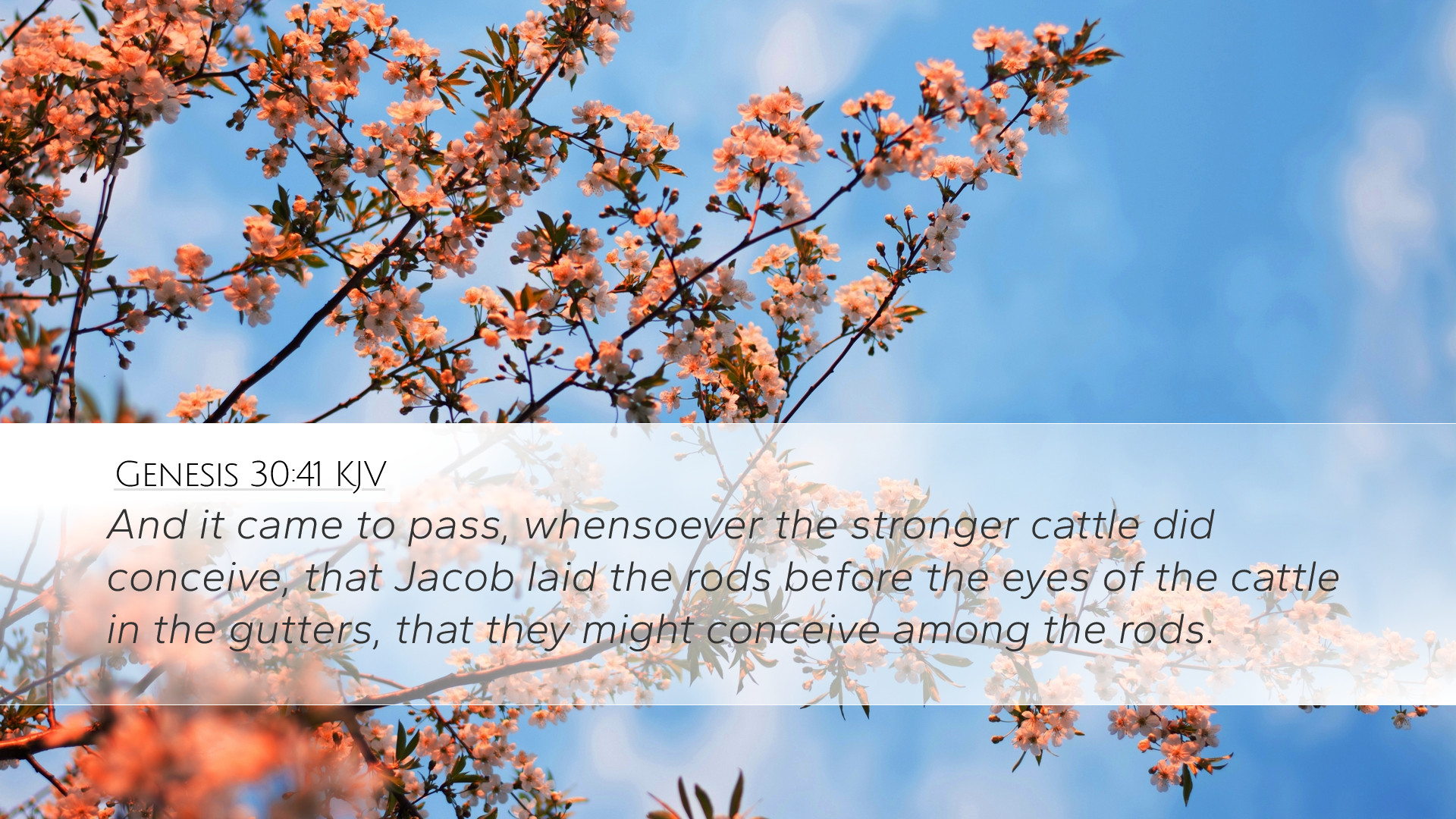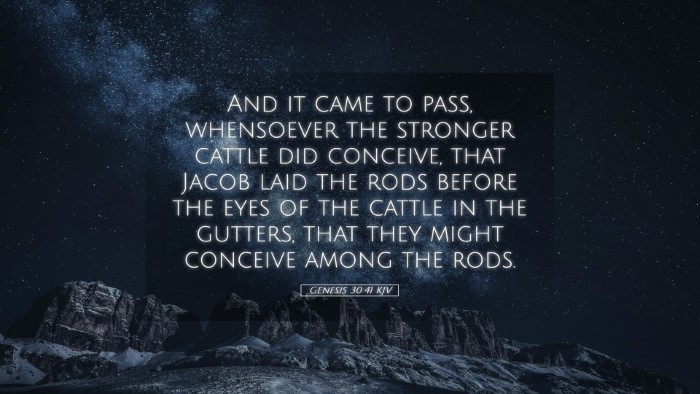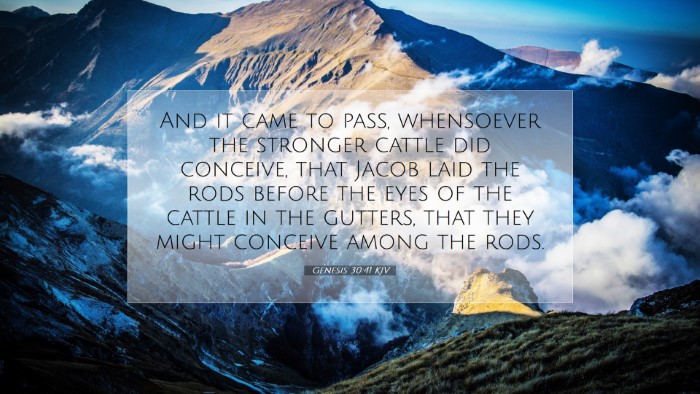Commentary on Genesis 30:41
Genesis 30:41 reads: "And it came to pass, whensoever the stronger cattle did conceive, that Jacob laid the rods before the eyes of the cattle in the gutters, that they might conceive among the rods." This verse is pivotal in understanding the narrative of Jacob and his negotiation with his father-in-law, Laban, regarding the livestock and the blessings upon Jacob's household. The commentaries of Matthew Henry, Albert Barnes, and Adam Clarke together present a multifaceted view of this biblical event.
Contextual Analysis
This verse occurs within a larger narrative detailing Jacob’s struggle with Laban and his strategic measures to increase his wealth. After years of labor, Jacob seeks to secure his own family’s prosperity. Laban, as his employer and father-in-law, has manipulated the terms to his advantage, leading Jacob to employ unique breeding strategies to ensure he receives the best animals from Laban's herd.
Matthew Henry's Commentary
Matthew Henry emphasizes that Jacob's actions were not merely superstitious but rather a display of his acute understanding of animal husbandry. He notes that Jacob's ingenuity in using the rods reflects a masterful grasp of breeding techniques that were insightful for his time.
- Divine Providence: Henry asserts that God’s providence was at work in Jacob’s efforts, suggesting that while Jacob had wisdom, it was ultimately God who ensured that Jacob would prosper despite Laban's attempts to undermine him.
- God’s Blessing: He reflects that Jacob’s success was a visible manifestation of God’s blessing upon him, illustrating the broader theme of divine favor throughout the patriarchal narratives.
- Moral Lesson: Henry draws a moral lesson about the virtues of diligence and resourcefulness, underscoring that faith must be accompanied by action.
Albert Barnes' Commentary
Albert Barnes provides a detailed examination of agricultural practices in ancient Israel that contextualize Jacob’s actions. He emphasizes how Jacob's method involved more than just superstition; it highlighted his knowledge of animal breeding as well as the practical steps he took to ensure success.
- Attention to Detail: Barnes posits that Jacob was meticulous in his methods, suggesting that he understood the complexities of animal reproduction, which were crucial for maximizing his herds.
- Symbolism of the Rods: He interprets the rods as a possible symbol of Jacob’s willpower and determination, suggesting that they represented the effort required to achieve his ambitions.
- Spiritual Reflection: While Jacob’s technique appeared to be a clever manipulation, Barnes warns against misplacing faith in physical objects alone; the assurance of success lies ultimately in God’s favor.
Adam Clarke's Commentary
Adam Clarke takes a more analytical approach, addressing the use of rods and their psychological impact on breeding. He comments on various theories surrounding Jacob's technique, weighing both the natural and the supernatural implications of his actions.
- Natural vs. Supernatural: Clarke debates whether Jacob’s methods attract divine favor, positing that while Jacob took physical measures, there was a deeper level of divine intervention influencing the outcomes.
- Cultural Practices: He grounds his analysis in cultural norms of the time, suggesting that manipulating breeding through visual stimuli was not uncommon in agrarian societies, thus placing Jacob’s actions within a broader historical context.
- Reflection on Ambition: Clarke reflects on the nature of ambition, suggesting that Jacob's actions serve as an internal struggle with his ethical approach to acquiring wealth and success.
Theological Implications
Theologically, Genesis 30:41 opens rich discussions on providence, ethics, and human agency. Each commentary invites the reader to consider not just the mechanical process of breeding livestock but highlights the intersection of divine action and human effort.
- Divine Sovereignty: These reflections underscore a key biblical theme: God’s sovereignty over human endeavors. Even as Jacob employed clever methods, it was God’s will that directed the outcome.
- Ethics of Wealth Acquisition: The manner of acquiring wealth raises ethical questions pertinent to faithful living; believers are encouraged to rely upon God while employing their abilities wisely.
- Role of Faith and Works: The blend of faith in God’s promises with active engagement in the world showcases a consistent biblical pattern of living—acting in faith while trusting in God’s overarching plan.
Conclusion
Genesis 30:41 serves as a profound reminder of the blend of human initiative and divine providence. The insights provided by Henry, Barnes, and Clarke amalgamate to offer pastors, students, and theologians wisdom on navigating the complexities of faith in action. The life of Jacob illustrates both the challenges and intricate dynamics of faithfulness amidst adversity, ultimately revealing the richness of God’s blessing when applied with diligence and ethical consideration.


